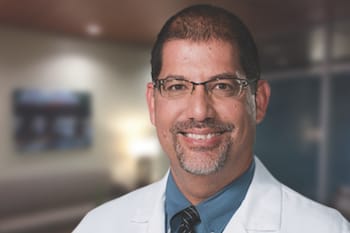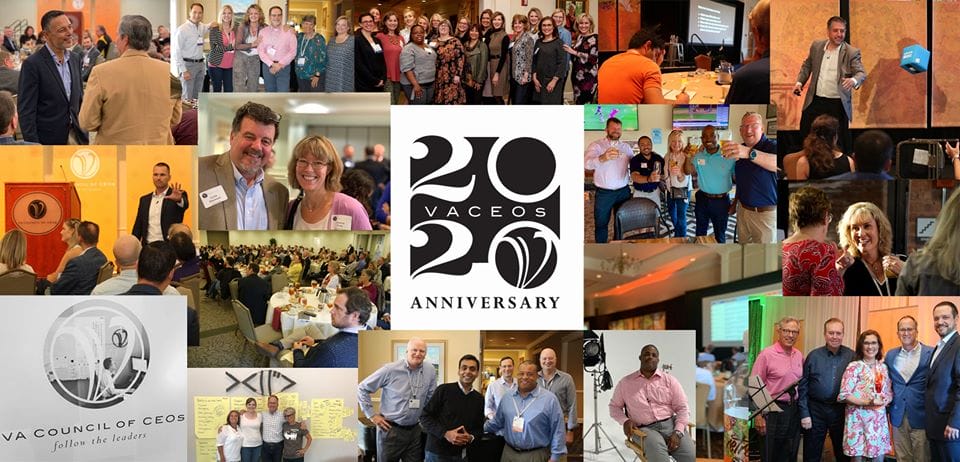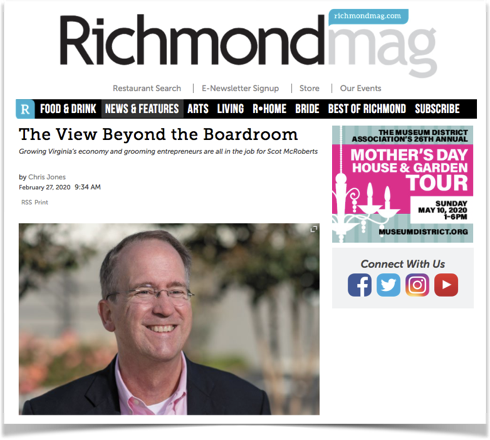We’re Here to Serve. A Letter to VA Council of CEOs Members and Sponsors.
 Dear VACEOs Members and Sponsors,
Dear VACEOs Members and Sponsors,
We have been closely monitoring the situation with COVID-19. At this time of uncertainty, community is more important than ever. While in-person meetings are curtailed, it is vital that we keep meeting, keep learning, and keep supporting one another.
We’ve found video conferencing to be a great way to keep these vital conversations going. Last week I shared video-meeting guidelines and resources with roundtable/forum leaders. Our staff is going entirely remote after today, but we are equipped to stay connected and working.
We are working to continue our mission – connecting CEOs for learning and growth – including finding ways to connect our members who are not currently in a roundtable. The Board of Directors will meet this week to discuss contingency plans for upcoming events and most importantly, continue the conversation about other ways we can serve our members during this time of disruption. See below my signature for the current status of upcoming events.
We will share our plans with you as they unfold. In the meantime, if you have any ideas for how we can serve you and our community, please reach out to me. We are here to serve.
Sincerely,
Scot McRoberts
Executive Director
Virginia Council of CEOs
804-564-9317 mobile
Current Event and Meeting Status – March 16, 2020
March 19 – Finance Committee is CANCELLED
March 19 – Called Board of Directors Meeting via videoconference is ON
March 26 – Quarterly Luncheon is CANCELLED
March 31 – Advisory Board Meeting is pending. May be held via videoconference
April 1 & 2 – Get to Know VACEOs events will be moved to videoconference
April 22 – Board of Directors Meeting will be held either in person or videoconference
April 29 to May 1 – Annual CEO Retreat is pending. A determination will be made by March 25.
VACEOs Executive Director Featured in Richmond Magazine Article
Virginia Council of CEOs Executive Director Scot McRoberts was recently featured in “The View Beyond the Boardroom: Growing Virginia’s economy and grooming entrepreneurs are all in the job for Scot McRoberts” — a Richmond Magazine article by Chris Jones.
In the post, McRoberts shares his views on Virginia’s economic stability, his role as a CEO connector, and the four identifiable traits that entrepreneurs should possess to develop and sustain their businesses.
Wrote Jones, “McRoberts sees entrepreneurs as visionaries, people who muster the grit and determination to do whatever it takes to see their plans through to fruition. They value the ideas they bring to the table that can solve problems in the world.”
Read the full article here.
When It Comes to Heart Health, What You Don’t Know Can Hurt You

And if you’re in your 40s and 50s, your heart disease risk is also increasing based purely on your age – nearly one in every 100 men develops signs of heart disease by the time they are 45, and that risk doubles by the time they are 55. For women, the risk starts to increase in yours 50s.
In short, the lifestyle habits, stress levels, and age of most CEOS forms a recipe that significantly increases the risk for heart disease, which remains the No. 1 killer of men and women globally.
So what can you do to protect yourself, your company, and your family? The key is knowledge. You can, and should, know as much as possible about your heart health and your risk factors for heart disease. And that starts with advanced cardiovascular screenings.
What Tests Make Up Advanced Cardiovascular Screening?
The American Heart Association’s recommended heart health screenings look at things like blood pressure, cholesterol, body mass index, blood glucose, and lifestyle habits (smoking, exercise level, diet). But as we discussed earlier, as a CEO who feels the pressure of supporting your family and your employees’ families, you need more information to feel confident about your heart health. And that’s where advanced cardiovascular screenings come into play.
Next time you go in for a physical or cardiology exam, ask about these advanced screenings. Keep in mind, most advance cardiovascular screenings go beyond what insurance covers each year, so you pay out of pocket for some, but the trade-off in knowledge can be well worth it.
- EKG. Measures electrical current in the heart to determine heart rate, rhythm and other information regarding the heart’s condition. They are used for structural change, abnormal rhythm, or past damage.
- Blood (advanced cardio profile and cholesterol/lipids). Goes beyond “good” and “bad” cholesterol to provide a detailed analysis of plaque-causing lipoproteins, as well as revealing markers of inflammation in your vessels and assessing metabolic health.
- CT Heart Scan. Evaluates for the buildup of plaque and calcium that could indicate risk for future heart attack as well as signaling increased risk for widespread cardiovascular disease.
- ApoE Genetic Marker Evaluation. This genetic marker affects how your body uses statins and how easily your body is able to regulate cholesterol with diet, exercise, and statin medication. This test may also indicate an increased risk for Alzheimer’s disease.
- Vascular View. These tests combine to give you a good measurement of how blood is flowing throughout the body from the heart and can provide indications of plaque that could cause stroke. A vascular view includes:
- Carotid Artery Screening. Measure the buildup of plaque, calcium and inflammation in the carotid artery.
- Aortic Aneurysm Screening. Checks for aortic aneurysm.
- Peripheral Artery Screening. Determines the presence of Peripheral Arterial Disease (PAD), more commonly known as hardening of the arteries, which constricts the flow of blood in the extremities.
You might have noticed that a Treadmill Stress Test is not on this list — these may also be referred to as a Stress Echo Test or a Nuclear Stress Test. Whichever version you choose, these types of stress tests are diagnostic tools, not screening tools. As diagnostic tests, stress tests are helpful if you are already experience symptoms of cardiovascular disease or are at high risk for recurrent cardiovascular disease.
A well-exercised heart provides a wealth of information to the physician with regard to patients that are presenting current symptoms of heart disease. For patients without heart disease, this test only measures the fitness of your heart today. Although it feels like a significant test because you may be running and sweating and hooked up to electrodes, a stress test is not going to be able to predict the likelihood of a future heart event.
What Risk Factors Guide Advanced Cardiovascular Screenings?
Not everyone needs every test we mentioned before. Which advanced cardiovascular screenings are right for you depends on your personal risk factors. Your doctor can help decide which tests make the most sense for you. Here are a few common considerations.
- Age. With the presence of other risk factors, a cardiovascular screening may be a good option for setting a baseline beginning at age 40. At age 50+, the risk increases for everyone.
- Family history. Family history influences risk factors, less because of genetics (which influence only 10% to 20% of health outcomes) than shared environmental factors, such as lifestyle, behavior patterns, and habits. However, a strong family history might encourage earlier testing.
- Prior testing. Based on how long ago those screenings took place and the results, any previous advanced cardiovascular screening can influence when and what kind of tests are recommended.
- Lifestyle. Factors such as your current fitness level, diet, or stress management can increase or reduce your risk for cardiovascular disease.
- Level of concern. If you’re really worried about your heart health, if may bring you peace of mind simply to know your current health status and level of risk.
How Can You Prevent Cardiovascular Disease?
In addition to advanced heart screenings, you can do other things to improve your overall cardiovascular health:
- Monitor your blood pressure. Be aware that recommendations/guidelines can change. At the end of 2017, the American College of Cardiology lowered its definition of hypertension to a blood pressure level of 130/80 mm Hg rather than 140/90. The ideal blood pressure is 120/70.
- Consider a plant-based diet. The DASH Diet (Dietary Approaches to Stop Hypertension), which is a plant-focused diet, is a popular option.
- Know your family history and share this information with your doctor.
- Adopt other healthful lifestyle changes. Get regular exercise. Quit smoking (or don’t start). Minimize stress levels. Maintain a healthy weight. And get a good night’s sleep.
Make Advanced Cardiovascular Screenings a Part of Your Annual Physical
As a CEO, you understand growth. Year over year growth means your company is growing and set up for success for the long-term. By adding advanced cardiovascular screenings to your annual physicals, you can track similar growth for the health of your heart year over year and set yourself up for success for the long-term.

Dr. David Pong is Director of Executive Health at PartnerMD. PartnerMD’s executive physicals provide the most medically advanced screenings available. Once a baseline is set for heart health, the client’s physician can get to work on improving health, reducing risk, and monitoring progress year over year. Learn more here.
Editors Note: Content provided by PartnerMD, a Sponsor of Virginia Council of CEOs.
Connie Bruce Earns Certified Association Executive Credential

“Connie exemplifies what the Council is all about — continuous learning and growth. A key member of our team for 14 years, she raises the bar for us every day! We are very proud of her accomplishment,” says Scot McRoberts, Executive Director, VA Council of CEOs.
To be designated as a Certified Association Executive, an applicant must have experience with nonprofit organization management, complete a minimum of 100 hours of specialized professional development, pass a stringent examination in association management and pledge to uphold a code of ethics. To maintain the certification, individuals must undertake ongoing professional development and activities in association and nonprofit management. More than 4400 association professionals currently hold the CAE credential. The CAE Program is accredited by the National Commission fro Certifying Agencies (NCCA).
About ASAE:
ASAE is a membership organization of more than 46,000 association executives and industry partners representing 7,400 organizations. Our members lead, manage, and work in or partner with organizations in more than a dozen association management disciplines, from executive management to finance to technology. In 2020, ASAE is celebrating 100 years of making the world better, safer, and smarter. The centennial anniversary represents ASAE’s role as a leader and supporter of progress and innovation in the association industry. Visit ASAE at asaecenter.org.
About the Virginia Council of CEOs
The Virginia Council of CEOs is a non-profit association that serves CEOs of small and mid-sized businesses in Virginia. The Council was founded in 2000 to connect CEOs so that they can learn and grow together. With 220 members in Central Virginia at this time, the Council is forming new CEO Roundtables in other parts of the state in 2017. Learn more at vaceos.org.
Virginia Council of CEOs Celebrates 20th Anniversary

In 2000, a small group of dedicated individuals from Richmond, Virginia rallied around a collective vision to start an organization whose purpose was to serve CEOs. They formed a state chapter, which soon became the Virginia Council of CEOs – a thriving, independent nonprofit that is now serving CEOs in the Richmond and Charlottesville regions.
With a core peer-to-peer roundtable concept with a focus on experience sharing, VACEOs has steadily evolved from a volunteer-driven organization, with only a few opportunities to learn and network during the year, into a growing and vibrant organization with an active governing body and a busy events calendar.

Scot McRoberts, executive director, VACEOs
“When we first started out, we were very volunteer-driven,“ says Scot McRoberts, executive director, Virginia Council of CEOs. “My role as executive director was part-time. We had a large board and relied heavily on volunteer leadership for recruiting, program development – really everything. Over the years, that’s changed dramatically. It’s become more staff driven, with volunteers more involved in the strategic leadership of the Council.” (Read complete history.)
Today the Council is 200+ members strong. As they move into the 21st century, their unwavering mission remains the same: connecting CEOs to facilitate learning and growth, with the peer-to-peer roundtable experience remaining at the heart of the organization.
In the last two years, McRoberts and dedicated members have expanded the Council’s mission to Charlottesville and has introduced new meeting concepts, designed to appeal to today’s busy entrepreneurs.
“What will always remain true is our search for ways to deliver more value to our members,” says McRoberts. “Whether that’s through new technology, like coordinating virtual CEO roundtables or through new speaker and learning experiences,” he adds.
The VA Council of CEOs will officially celebrate its 20th anniversary at a special event for its members, sponsors, and select guests at the Virginia Museum of Fine Arts on October 3, 2020.
Related links:


Recent Comments